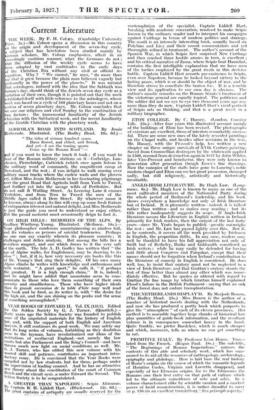Current . Literature
THE W$EK,: By F. H. .Cokoa. (Cambridge University ress. 5s.)—Mr. Colson opens tk discussion in this country
n the origin and development of the seven-day cycle, subject that has heretofore been . studied mainly_ by en-nen scholars. Mr: Colson emphasizes, albeit in an wed ingly cautious Manner': what the Germans do not ; hat the diffusion of -the , weekly cycle seems to have wen adopted byl vast multitudes in the early days f the Christian „Ern without any civil or official: re- gnition. Why "We cannot," he says, "do more than iy that it grew because the plain man believed vaguely but rofotindly in The 'power of- the planets." It was natural nit astrologers, imbued With the idea that the Sabbath was 'sturn's day, should think of the Jewish seven day cycle as a uriation of their own, though it ispointed out that the week stablished itself with little reference to the astrologers, whose eek was based on a cycle of 168 planetary hours and not on a 'stem of seven planetary .days. - -Mr. Colson' concludes that re owe our religious and civil. Sunday to the combination of we- factors ; the immemorial familiarity of the Jeivish 'hristian with the Sabbatical week, and the recent familiarity the Gentile Christian with the planetary week.


























































 Previous page
Previous page